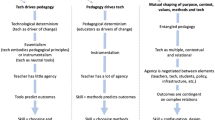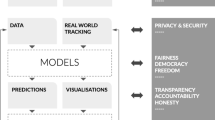Abstract
Empowering Minds (EM) is a project that has deeply integrated technologically expressive materials, including robotics and presentation and programming software, into the educational practices of teachers at more than a dozen primary schools across Ireland. Here, we present Empowering Minds as a model of constructionist learning and teacher professional development. As the project continues to grow, organisers are challenged to aim beyond sustainability to scalability, encouraging participants to develop ways of maintaining their local identities and their senses of control and ownership of the work and ideas. In this paper, we describe a collaborative project among four participating schools, including one teacher’s account of his students’ adapting a folkloric story in order to appropriate it for their own technical, narrative, and learning purposes. We emphasise the importance of a diverse, supportive community and adequate time for teachers’ self-directed learning to develop and epistemological changes to occur.
Preview
Unable to display preview. Download preview PDF.
Similar content being viewed by others
References
Butler, D., Martin, F., Gleason, W.: Empowering minds by taking control: Developing teachers’ technological fluency with LEGO Mindstorms. In: Proceedings of the SITE 2000, Charlottesville, VA, pp. 598–603 (2000)
Butler, D.: Self-determined Teacher Learning in a Digital Context: Fundamental Change in Thinking and Practice. Unpublished doctoral thesis, Dublin City University (2004)
Cavallo, D.: Technological Fluency and the Art of Motorcycle Maintenance: Emergent Design of Learning Environments. Unpublished doctoral thesis, MIT, p. 225 (2000)
Chafee, R.: The Teaching of Architecture at the Ecole des Beaux-Arts. In: Drexler, A. (ed.) The Architecture of the Ecole des Beaux-Arts, MOMA, New York (1977)
Díarmaid agus Gráinne, http://timelessmyths.com/celtic/ossian.html#Pursuit
The Digital Hub Liberties Learning Initiative, http://www.thedigitalhub.com/
Dunne, J.: Back to Rough Ground: ‘Phronesis’ and ‘Techne’ in Modern Philosophy and in Aristotle. University of Notre Dame Press, London (1992)
Freire, P.: Pedagogy of the oppressed. Penguin, London (1972)
Gadamer, H.G.: Truth and Method Wahrheit und Methode. 1965. In: Barden, G., Cumming, J. (eds.) 2nd edn., Sheed and Ward, London (1975)
von Glasersfeld, E.: Cognition, construction of knowledge and teaching. Synthese 80, 121–140 (1989)
Grundy, S.: Curriculum: Product or Praxis. Falmer Press, London (1987)
Knowles, M., Holton, E., Swanson, A.: The Adult Learner: the definitive classic in adult education and human resource development, 5th edn. Butterworth, Heinemann (1998)
Kuhn, S.: Learning from the Architecture Studio: Implications for Project-Based Pedagogy. Intl. Journal of Engineering Education 17(4 & 5), 349–352 (2001)
Lindeman, E.: The Meaning of Adult Education. New Republic, New York (1926)
Martin, F.: Circuits to Control: Learning Engineering by Designing LEGO Robots, PhD dissertation, MIT Media Laboratory, p. 65 (1994)
Martin, F., Butler, D., Gleason, W.: Design, story-telling, and robots in Irish primary education. In: Proc. of IEEE Systems, Man, and Machine Conf., Nashville, TN (2000)
O’Neill, J.: On Schools as Learning Organizations: A Conversation with Peter Senge. Educational Leadership, pp. 20–23 (April 1995)
Papert, S.: Perestroika and Epistemological Politics. In: Harel, Papert (eds.) Constructionism, pp. 13–27. Ablex Publishing, Norwood (1991)
Rasmussen, J., Butler, D., Davenport, G.: A web-based environment for assembling multimedia learning stories in Irish primary education. In: Proc. IEEE ICALT 2002 (2002)
Senge, P.: The Fifth Discipline. Randon House (1990)
Senge, P., et al.: Schools That Learn: A Fifth Discipline Fieldbook for Educators, Parents, and Everyone Who Cares About Education. Doubleday-Currency, NY (2000)
Strohecker, C.: Media Lab Europe (promotional brochure). Dublin (2002)
Sugrue, C., Morgan, M., Devine, D., Rafery, D.: Policy and Practice of Professional Development for Primary and Post-Primary Teachers in Ireland. Report commissioned by the Research and Dev’t Committee, Dep’t of Education and Science, p. 37 (2001)
Ueda, N.: Multimedia Unplugged: A Workshop on Learning Designs at the neoMuseum, Japan in Articles by CRN (Child Research Net) Advisory Board Members (1999), From: http://www.childresearch.net/CYBRARY/MABM/MEMBER6.HTM
Author information
Authors and Affiliations
Editor information
Editors and Affiliations
Rights and permissions
Copyright information
© 2006 Springer-Verlag Berlin Heidelberg
About this paper
Cite this paper
Butler, D., Strohecker, C., Martin, F. (2006). Sustaining Local Identity, Control and Ownership While Integrating Technology into School Learning. In: Mittermeir, R.T. (eds) Informatics Education – The Bridge between Using and Understanding Computers. ISSEP 2006. Lecture Notes in Computer Science, vol 4226. Springer, Berlin, Heidelberg. https://doi.org/10.1007/11915355_24
Download citation
DOI: https://doi.org/10.1007/11915355_24
Publisher Name: Springer, Berlin, Heidelberg
Print ISBN: 978-3-540-48218-5
Online ISBN: 978-3-540-48227-7
eBook Packages: Computer ScienceComputer Science (R0)




